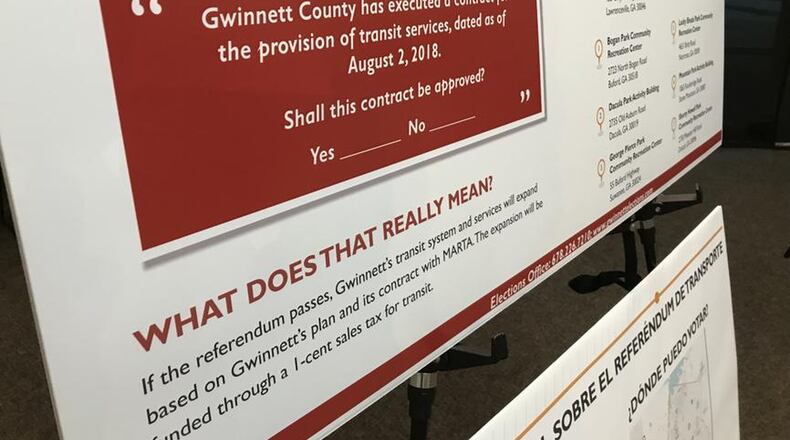Later this month, Gwinnett voters will begin voting to decide if their county will join MARTA — and if they will spend nearly four decades paying a new 1 percent sales tax to fund a dramatic expansion of transit services.
But voters might not know it from their ballots.
The referendum question that thousands of Gwinnett voters will confront between Feb. 25 (the start of early voting) and on March 19 (Election Day) tells them simply that the county has "executed a contract for the provision of transit services." It asks them if that contract should be approved.
Ballot measures in Georgia and across the county have a history of being curiously composed or outright misleading and, considered in that context, Gwinnett's question is pretty straightforward. But it makes no direct mention that the pending contract is with MARTA, the transit agency with a history of rejection by suburban residents. Or that it involves residents paying an additional sales tax until 2057. Or what those tax revenues will go toward, exactly.
Officials say they've otherwise been more than transparent about all of those things, that they've made it clear what's at stake: MARTA taking over Gwinnett's transit operations and greatly expanding them according to a $5.5 billion plan that includes the first-ever passenger rail extension into the county. The informational sessions the county is hosting for voters over the next several weeks certainly don't shy away from all that.
But not every voter will attend one of those sessions, or read the newspaper, or watch local TV. And by avoiding certain words, the vagueness of the ballot question could play a role in how some voters vote, said longtime University of Georgia political scientist Charles Bullock.
“It avoids some language which would result in a knee-jerk reaction that ‘I’m voting against that,’” he said. “… It’s designed to increase the likelihood that it’s going to pass.”
Not mentioning MARTA (which has twice been soundly rejected by Gwinnett voters) or taxes (which can evoke an immediate negative reaction) certainly doesn’t hurt the pro-transit cause, Bullock said.
Gwinnett shot down MARTA in 1990 but changing demographics have increased the county's appetite for mass transit. Every vote will count in a standalone election that will likely be decided by a narrow margin.
But two of the people most directly involved with creating the legislation that included the question — state Rep. Kevin Tanner and Gwinnett Commission Chair Charlotte Nash — balked at suggestions of any grand design behind how it’s worded.
Tanner said he didn’t “remember any specific conversation or debate” about the phrasing of the ballot question. Nash said she didn’t “recall specific discussion.”
“As you know from hearing our discussions and presentations, we are totally upfront about the fact that Gwinnett’s contract for transit services is with MARTA,” Nash wrote in an email to The Atlanta Journal-Constitution. “You and other members of the media have helped make this clear to your readers.”
The legislation that included the question was adopted by Georgia's legislature in March 2018 and signed by then-Gov. Nathan Deal in May. Both dates were well before Gwinnett's Board of Commissioners and MARTA's Board of Directors finalized the contract that's now awaiting voter approval.
Then again, the legislation that paved the way for Gwinnett’s referendum did so by changing the language of the existing MARTA Act. And both Nash and Robbie Ashe (who previously served as MARTA’s board chair and is now its secretary) have said the discussions between Gwinnett and the transit agency started long before House Bill 930 was filed.
“I think this is as publicized and as transparent and as open of a process as you’ll find,” Tanner said. “I think people who are showing up on voting day know full well what they’re voting on.”
Gwinnett County is now several sessions into a weeks-long series of open houses about the MARTA special election. The public sessions include a handful of poster boards explaining various aspects of the referendum and a handful of county officials on-hand to offer further guidance.
Thanks to a state law that prohibits the use of government money to push for or against a referendum, officials are not allowed to advocate one way or another. But they can answer questions
A few dozen voters typically attend each session.
Lawrenceville resident Taylor Drake attended the very first session at Buford’s Bogan Park. He called the referendum question “pretty cut and dry” — but admitted that he was already pretty well informed about what was involved with his vote.
“Not everybody is,” Drake said. “So it still could be confusing.”
GWINNETT’S MARTA REFERENDUM
The ballot question: "Voters will see the ballot question phrased this way when they visit the polls: "Gwinnett County has executed a contract for the provision of transit services, dated as of August 2, 2018. Shall this contract be approved? YES __ NO __"
What it means: A yes vote would be a vote in support of ratifying Gwinnett's pending transit service contract with MARTA, allowing it to take over Gwinnett's current transit services and greatly expand them — including a possible rail extension into the Norcross area.
A yes vote would also trigger a new 1 percent sales tax to pay for such projects. Purchases in Gwinnett are currently subject to 6 percent sales tax.
The new countywide sales tax would remain in effect until 2057 and garner billions of dollars. Collected funds would be remitted to Gwinnett County, which would then write checks to MARTA for projects and operations.
About the Author
Keep Reading
The Latest
Featured




